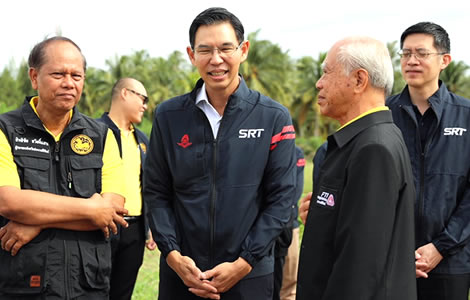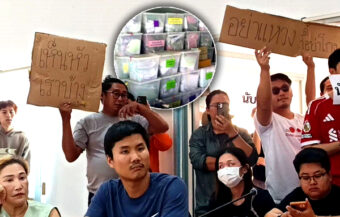SRT chief Weerit Amrapal resigns after suing the powerful Chidchob family over Khao Kradfong land as the new government reverses the airport rail contract, sparking widespread legal, political, and infrastructure turmoil across Thailand’s state agencies.
Thailand’s SRT chief resigned abruptly after suing the powerful Chidchob family to reclaim state lands. The move coincides with the new government reversing the airport rail links contract, sparking legal and political turmoil. Analysts warn the shift exposes deep friction in state agencies and official ranks, threatening key infrastructure projects, while signalling the new government’s overt moves to reverse decisions made by its predecessor.

The Governor of the State Railway of Thailand (SRT), Weerit Amrapal, has resigned after only one year in office. He submitted his resignation letter on October 1, 2025, barely a year after signing up for the top job on September 19, 2024.
The SRT Board is expected to consider the resignation this October, with the resignation taking effect on October 30, 2025. Consequently, Thailand faces renewed uncertainty over both infrastructure projects and state land disputes.
Analysts and respected academics suggest political pressure was a decisive factor in his resignation. Moreover, the resignation followed Mr. Weerit’s decision to initiate legal proceedings against the powerful Chidchob family.
Former judge says the resignation is linked directly to the Khao Kradfong land lawsuit filed by SRT
These proceedings concern two state-owned plots of land in Buriram, part of the notorious Khao Kradfong area. Importantly, these plots hold significant strategic and financial value, heightening the political stakes for all involved.
The plots include land number 3466, owned by Mrs. Karuna Chidchob, wife of Newin Chidchob, CEO of Buriram United Football Club. Additionally, land number 8564 belongs to Silachai Buriram (1991) Co., Ltd. Both plots are located at the Khao Kradfong intersection in Isan Subdistrict, Mueang Buriram District.
Consequently, the SRT filed a lawsuit with the Office of the Attorney-General (OAG) on September 29, 2025, to revoke or evict the occupants. This follows a previous request filed on September 12, 2025, making it a coordinated legal effort.
Observers note that senior state officials have long faced legal entanglements and political pressures due to SRT governance. Furthermore, the Khao Kradfong land dispute highlights the intense combination of business and politics within Thailand’s state agencies. The SRT, at the centre of this controversy, has historically struggled to balance financial, legal, and political demands.
Reversal of airport rail deal by new government heightens political and legal pressures on SRT boss
Simultaneously, the high-speed rail project linking Don Mueang, Suvarnabhumi, and U-Tapao airports has generated considerable tension. Originally signed under the government of General Prayut Chan Ocha in 2019, the project aims to modernise Thailand’s airport connectivity and stimulate regional economic growth.
However, it has faced repeated delays due to payment disputes and postponed start dates. Consequently, private contractors and government agencies have engaged in prolonged negotiations.
A draft amendment to the rail contract was submitted to the Attorney-General’s office for review. Although negotiations with private sector partners were nearing conclusion, a government change altered the process.
As a result, the new Minister of Transport, Phiphat Ratchakitprakarn of the Bhumjaithai Party, countermanded instructions to agree a new deal. He insisted on adhering to the terms of the original agreement, which had already expired.
Legal and financial dilemmas threaten project completion and place potential liability on SRT governor
This insistence creates a legal and financial dilemma. If negotiations fail, the contract could be terminated. Consequently, compensation for lost opportunities would be required, placing potential liability on the SRT governor authorised to sign the contract.
Therefore, political and legal pressures combined to make Mr. Weerit’s position unsustainable. Analysts note that the convergence of these pressures is rarely seen in recent Thai infrastructure projects.
The SRT has a long history of administrative and financial challenges. In particular, the high-speed rail project has been plagued by delayed payments, land issues along the route, and repeated postponements. The original construction start date has been extended multiple times, further increasing tension between the government and contractors. However, a revised and agreed-upon new contract was recently sent to the Office of the Attorney-General for review.
Moreover, Mr. Weerit’s legal action against the Chidchob family added another challenging situation. Mrs. Karuna Chidchob’s ties to powerful political and business networks raised the stakes considerably. Her husband is seen as the de facto leader of the ruling Bhumjaithai Party.
Khao Kradfong plots’ strategic and financial value makes eviction lawsuit politically charged
Furthermore, analysts suggest that the Khao Kradfong plots’ strategic value is as important as their financial worth. The eviction lawsuit represents one of the first serious attempts by the SRT to assert control over these state lands in decades.
The resignation also highlights broader governance challenges. It demonstrates how infrastructure projects are impacted by political dynamics, legal accountability and financial risks. The high-speed rail project, designed to improve airport connectivity, now faces renewed uncertainty.
Indeed, it is back to the drawing board.
In this case, the consortium delayed payments while also facing delays in commencing construction. Meanwhile, officials faced public scrutiny. Certainly, any misstep can trigger either litigation or political backlash.
Observers warn that the SRT’s current leadership predicament could slow decision-making. Previously, the OAG’s review of the contract was expected to provide further legal clarity and certainty. A new start. Now, the contract is deemed to have already expired.
Meanwhile, the high-speed rail project remains under intense observation by the public, investors, and political stakeholders alike. Analysts predict that the government’s approach at this time will determine whether the project succeeds or stalls indefinitely. It must either find a new contractor or agreement, or cancel the plan altogether.
Political transitions create leadership instability and intensify pressures on state executives
Furthermore, the resignation reflects broader challenges in state enterprises across Thailand. Political transitions often trigger policy reversals, renegotiations, and leadership instability.
Projects as large and complex as the airport rail network are particularly vulnerable to these shifts. Consequently, leadership continuity within state agencies is critical for maintaining investor confidence and project timelines.
The SRT’s struggle illustrates how infrastructure development can become entangled in political disputes. The Khao Kradfong land case and the high-speed rail project exemplify these tensions. Analysts emphasise that Thailand’s ability to execute large-scale projects depends on clear leadership and legal certainty. Any disruption in decision-making risks substantial financial and reputational costs for the government.
Mr. Weerit’s resignation highlights the human toll of such pressures. High-ranking officials often face intense scrutiny and legal risk when navigating contentious projects. In his case, contract disputes, political directives, and lawsuits converged within weeks, creating untenable conditions. Consequently, the governor’s decision to resign signals both personal and institutional stress.
SRT faces a real leadership crisis amid land disputes, high-speed rail uncertainty and political pressure
Finally, the struggling SRT faces one of its most critical junctures in its history. The combination of the Khao Kradfong land dispute, high-speed rail contract uncertainty, and political pressure has created an unprecedented leadership crisis. It appears to have beenall too much for Mr. Weerit.
Significantly, the Thai legal system imposes more requirements on senior executives than in Western countries. Basically, they can become embroiled in disputes or affected by their actions or failure to act. This is due to the country’s sweeping Criminal Code, which imposes duties of stewardship with the threat of criminal prosecution.
Observers say the outcome of this crisis will certainly influence ongoing infrastructure development, contract negotiations, and state enterprise appointments in Thailand. This includes the rail network.
$7.4 billion airport rail network deal involves major Thai conglomerate and a 50-year concession period
The deal to build the 220 km rail network was signed in 2019. The rail services were due to open in 2029 and represented a $7.4 billion project. The consortium involves the Charoen Pokphand Group (CPG), Thailand’s huge conglomerate, which was due to have a 50-year concession.
As the SRT Board prepares to act on the resignation, all eyes are on the government’s next steps. Meanwhile, the OAG’s review and potential legal battles are only one corner of turmoil within the ranks of the government.
Elsewhere, there is an investigation into an air transport project linked with Prime Minister Anutin Charnvirakul.
DSI and Election Commission probes move forward, with intensifying fears of government interference
Meanwhile, the serious internal investigation at the Department of Special Investigation (DSI) and a related probe at the Election Commission are moving forward. These are related to strong suspicions of corruption and collusion in the 2024 Senate election. However, the police agency’s probe is now overseen by a Bhumjaithai Party Minister of Justice, who has pledged not to interfere. Nevertheless, he has just appointed a panel of experts linked to the probe to advise him.
In short, there are fears that the new interim government is exercising its administrative muscle to reverse courses set by the previous Pheu Thai administration. This is inevitably a source of conflict and tension, making it difficult for some public servants and state agency officials.
Chuwit raises the alarm over a ‘working group’ into sensitive cases set up by the new Justice Minister
Red tape and bureaucracy killing the Thai economy. 91.2% of top executives says it is far too much
On Wednesday, Mr. Was Tingsamit, an independent academic and former senior judge at the Supreme Court, suggested that the real reason for Mr. Weerit’s resignation was the Khao Kradfong land lawsuits. The former judge noted that the top executive signed his resignation letter on the same day he signed off on the legal actions by the State Railway of Thailand (SRT) to exercise its land rights against the Chidchob family in Buriram.
Join the Thai News forum, follow Thai Examiner on Facebook here
Receive all our stories as they come out on Telegram here
Follow Thai Examiner here
Further reading:
Election Commission moves forward steadily with Election Collusion case linked to Bhumjaithai Party
Bombshell news as Bhumjaithai Party leadership is summoned by Election Commission over Senate poll


















